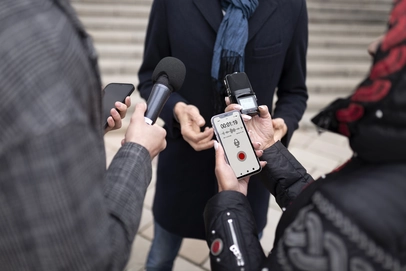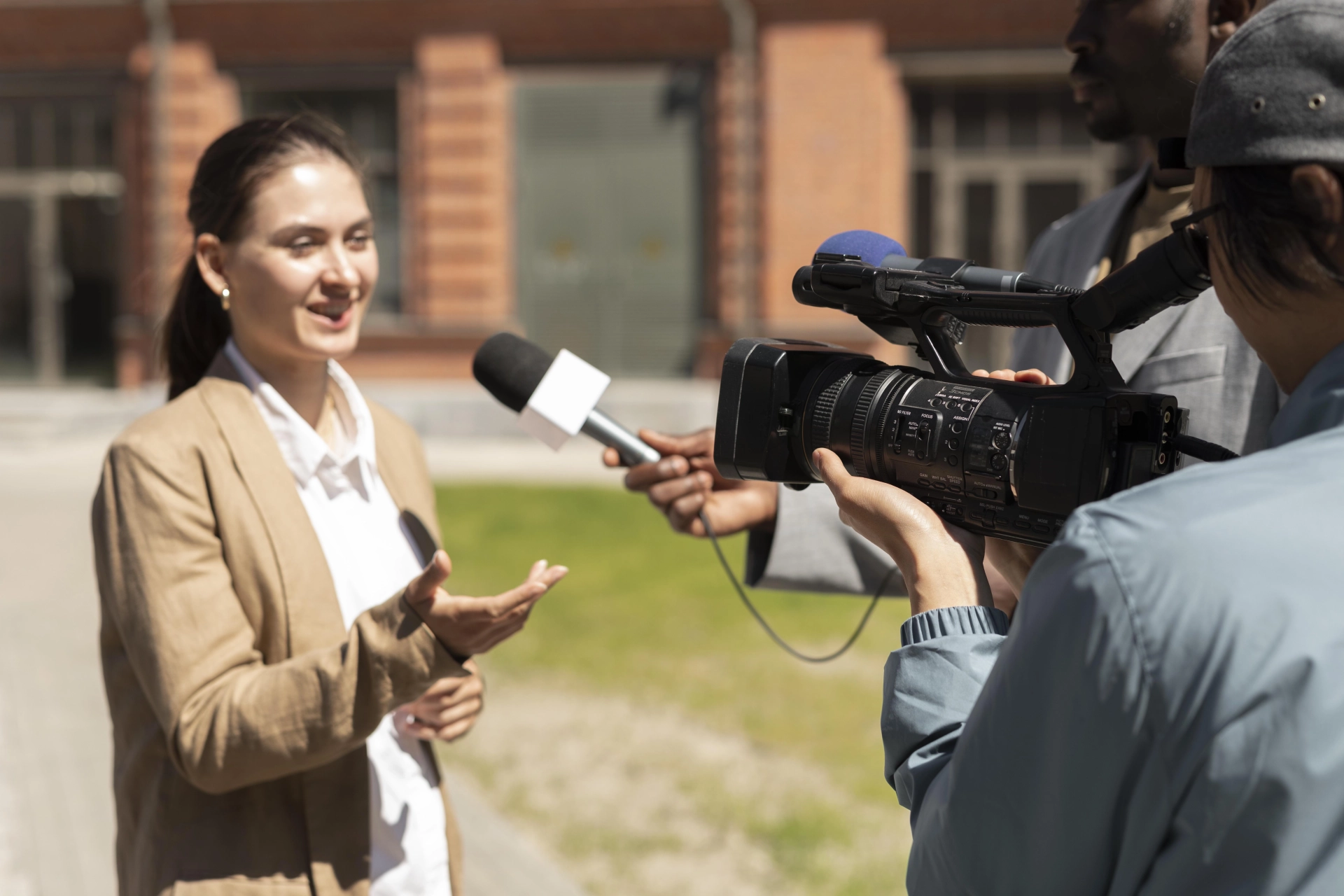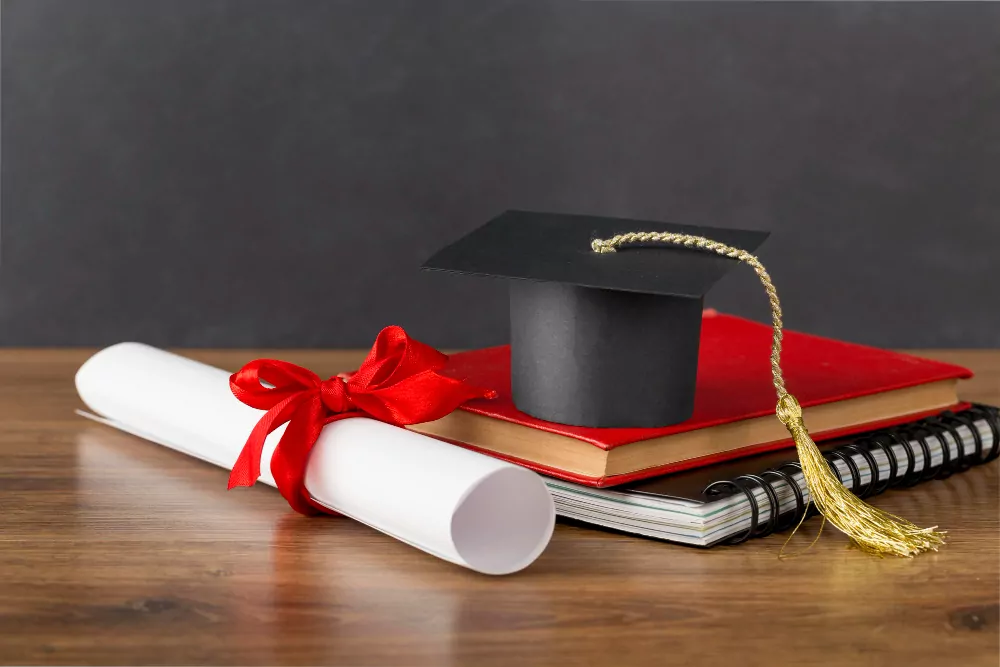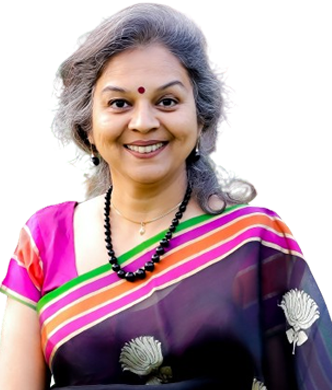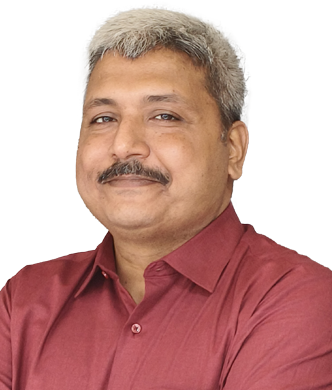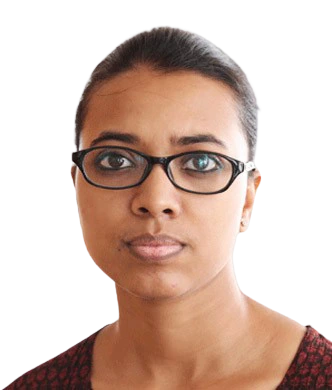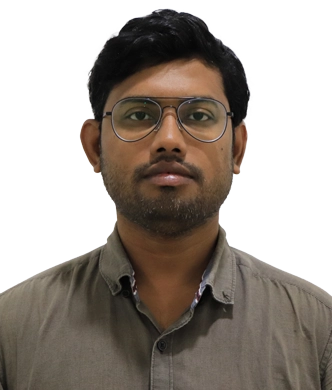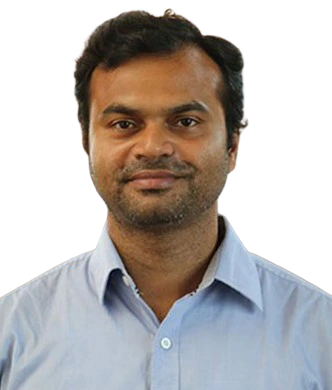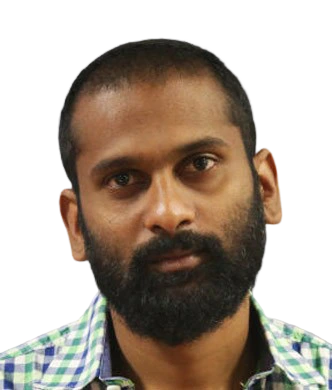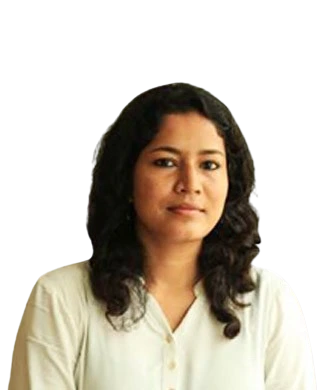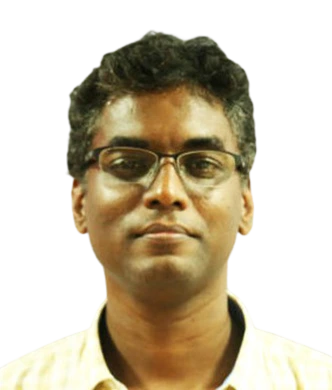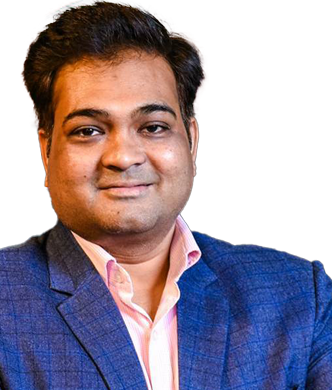School of Digital Media and Communication
Mahindra University’s School of Digital Media and Communication brings to you the following opportunities for enrolment:
- 3-year Bachelor of Journalism and Mass Communication (BJMC)
- 4-year Bachelor of (Hons) Journalism and Mass Communication (BJMC Hons) based on merit from the 3-year BJMC program
- 4-year Bachelor of Technology in Computation and Media (BTCM)
- MA in Journalism and Mass Communication
- Doctorate of Philosophy (Ph.D.) in Media and Communication
It aims to prepare our graduates as righteous, responsible, competent and globally acceptable citizens of the world. It is the outcome of perceived need at the intersection of the fields and practices of mediated communication, communication technology and social change.
With a focus on creativity and innovation in the digital age and beyond. Our School of Digital Media and Communication provides a platform for aspiring media professionals to understand the role of communication in our lives. In doing so, they develop competencies in three directions—the conceptual, the practical/professional/technical, and the ethical. Our programs offer a set of courses that refreshes different in approach. Starting with an understanding of how we learn as humans, students learn how media psychology works. As a new school, we recognize the deep and wide gaps in the supply of professional graduates in today’s media and technology industries. One of the widest and deepest such gaps is in understanding how humans think, feel and work. This is one of the components of study that will make our graduates a cut above the rest.
The school provides state-of-the-art facilities including a spacious audiovisual studio floor with a production control room (PCR), an audio studio, a MoJo studio (with cyclorama), an immersive (VR-XR) studio floor, and a fully equipped editing and computing laboratory with uncompromising features. We use industry standard equipment after carefully researching and examining those standards, while also augmenting our facilities for future use. Thus, our students learn in the best possible environment while gaining various professional and technical competencies as they learn media and related practices.
Come, discover what you can do, and be surprised!
Hence, the purpose of the School is to equip students with the analytical tools to confront the world of communication, in the following ways:
- To provide an edge to our graduates through their competencies.
- To nurture learners through real-world practices, to improve upon them, and to build an ethically sound ecosystem.
- To use a technology-equipped and humanities-centric approach.
Our School of Digital Media and Communication was born in the academic year 2023-24 with two bachelor’s programmes. We offer a 3-year Bachelor of Journalism and Mass Communication and a 4-year Bachelor of Journalism and Mass Communication (Hons.), and a 4-year B.Tech in Computation and Media. With the application of digital technology, the media and related industries have been experiencing unprecedented growth. The introduction of mediated communication for the public at large has meant that this growth has become a mass movement among “media prosumers”—consumers who are also producers of media texts. Since everyone equipped with a smartphone is a potential media prosumer, the practice of superior mediated communication defines its contours. This is not merely a technological change but a sociological one. To that end, our Bachelor of Journalism and Mass Communication and B.Tech. programmes recognize digital technology as an inevitable and integral part of mediated communication today and in time to come.
This exciting time also presents several challenges. The ever-evolving field of mass communication now, more than ever before, needs an all-round understanding of technology and sociology, between message and its construction. This convergence of information, entertainment, opinion, promotion and distribution presents an exciting new cornucopia of activities bundled together.
There is also convergence in another way. In addition to a steady demand for professionals in the more conventional roles in news, entertainment, and the allied areas of advertising and public relations, there is an increasing demand for digital journalists, content creators and digital marketing professionals. Legacy media platforms are investing heavily on the digital side of their businesses. Other industries, too, are investing in creating or recasting media rooms in digitized forms, from which internal and external communication and corporate storytelling occurs. The ability to understand, delineate and control each of these activities distinguishes the media and communication professional from a prosumer.
To that end, our programmes integrate all that is needed in this new and evolving ecosystem to deliver academically sound, research-oriented, practically trained graduates. You will gain exposure to cutting-edge developments, both in technology and techniques of creating content and its delivery for the functions of news, entertainment, PR, advertising, corporate communication, and digital platforms.
In 2024, we have added a Ph.D. programme in Media and Communication. Master’s programmes in journalism, mass communication, and communication management will be introduced in 2025.
Enabling the practical side of learning are our three digital studios:
- A large floor with two sets including a production control room (PCR), a greenscreen set, a conventional set, and a conveniently styled gallery-seating space;
- An audio studio; and
- An immersive media studio floor with cyclorama and other paraphernalia for such exciting productions as music videos.
- To nurture improved practices of mediated communication with an aim towards better societies capable of balancing the use of communication in responsible ways.
- To approach learning as a methodology to develop future thought.
- To prepare students to be changemakers using competencies.
At the School of Digital Media and Communication, it is our endeavour to see learning as a joint venture between the student and the institution. How a student peels an onion ring, going deeper into the funnel of learning, must be demonstrated by linking concepts to practice. Using this process, our courses are designed around student-centric learning processes and competency outcomes of three dimensions—conceptual, practical/professional, and ethical.
Through the period of a student’s journey, we will introduce a variety of learning mechanisms and tools, including classes, laboratory work, independent and field work, library, guest interactions, and self-discovery. However, the student will quickly recognize the complexities in the practice and learn to problematize practices while developing an increasingly firm grip on fundamental concepts of the functions of journalism, media production and communication management. It is this blend that makes our graduates technologically strong and ethically sound, conceptually clear and practically adept.
Exposing students to eclectic voices is an important part of their learning. Academic, institutional, and industry partnerships include reputed institutions and organizations from around the world. The student’s journey will be peppered with guest visits and demonstrations, field visits and internships. We expect the student to have fun while being serious-minded, relish hard work while not losing out on the enjoyment of life’s normal experiences.
The curriculum has been prepared with the student’s journey in focus. How does a student navigate the path to the world of practice? That is the fundamental pedagogic question we seek to answer; we believe the answer lies in taking the student through increasingly complex units of knowledge. Hence, amidst the cornucopia of coursework lie clearly focused pipelines for each strand. Faculty members are empowered at the School of Digital Media and Communication to bring their philosophies, perspectives, and content. Our institution welcomes and encourages the use of individual strengths and thought. Students will receive specific syllabi with textbooks (if any) and indications of reading material at the beginning of each course.
We will employ the highest standards to develop and nurture qualities needed for a student to be a changemaker. The input is carefully constructed keeping in mind the demands of industries and businesses, as well as the needs of our societies, to generate a conceptually, ethically, practically and behaviourally consummate graduate who is aware of the rights, responsibilities and privileges of an educated and communicative citizen. Special emphasis will be laid on digital and emerging media technologies as we further update the institution on the basis of technological and sociological developments.
Programme goals. The objectives of our programmes are heavily centred around the learner.
- Competency-building. To build the competencies through academic delivery that aims to develop sophistication of thought, value of ethics, and practice of rigour.
- Matching individual with society and industry. To have a student-centred approach that nurtures individuality by matching aptitudes and aspirations against scope and needs of media society and related industry.
- Building communicative societies. To approach learning as grounded yet dynamic sets of guidelines towards the achievement of communicative goals of society and industry.
- Interdisciplinarity. To relate and integrate the study of media with other disciplines especially in humanities and social sciences.
- Onion-peel. To adopt a general-to-specific approach to learning.
Thus, competency-building is the fulcrum of the collaborative interface between the School of Digital Media and Communication and the student. The various demonstrable elements of these competencies perform a critical role not only for a student in the commitment to their role and exercise of responsible agency, but also for the institution in its commitment to the student. To us, competency is not to be defined in narrow curricular or practical success terms, but as the development of a personality that is professionally, critically, and ethically superior—thinking problem-solving researchers and professionals who can rethink paradigms and not become cookie-cutter bench-warmers.
The tripod of competencies. As a derivation from the above philosophical grounding, each of our programmes emerge as a marker, a demonstration of the following competencies—in combination—that will define and test this pursuit:
- Conceptual competency: The academic grounding of thought in various subjects and fields upon which practice is founded.
- Professional competency: A preliminary familiarity in simulated and live environments with practices among communication industries and communicative institutions.
- Ethical competency: The development of a moral compass and an awareness of the need for a set of guiding principles for various forms of practices in industries and societies.
Furthermore, competency is a changemaking methodology, which goes well beyond the development of skills alone. It is the ability to adapt with a combination of acquired strengths and learnt behaviour. That is why we are convinced that the building of skills must necessarily accompany the construction of other attitudes that both enable and moderate our practices. The tripodic combination of competencies as described above is also individual. To that end, we believe it is imperative to keep our objectives student-centric and nurture individuals-in-societies—that is, individuals who are grounded in the governance of various industrial and sociocultural communities.
Our approach is multi-pronged in the sense that the student must be prepared both in and out of classrooms. Some forms this would take would bridge traditionally disparate paradigms:
- Professional and academically grounded programmes (neither a “trade school” nor a typical university programme, but a good combination of the two).
- Interdisciplinary with high emphasis on research.
- Project- and evidence-based progression in learning, creating and documenting tangible footprints of learning as the student progresses.
Two approaches that can sustain the University head and shoulders above the normal fare we observe around us. There are several methodological ‘firsts’ that the University would have. A broader philosophy of approaching academics as a student-centric endeavour rather than just a set of tasks for us to accomplish will go a long way in establishing the University as a pioneer in disruptive methods in higher education. This by corollary entails a student-centric vision, mission, plan, and pedagogy. How do we help a student achieve his/her professional objectives?
The approaches I have explained below are needed for the much-talked-about (yet elusive!) excellence in higher education per se. In communication, I believe they are both critical, but I suspect their relevance can easily be mapped onto other fields. As you may observe from these approaches, the pedagogy, or the “how”, has precedence over the content, or the “what” of higher education.
First, we ask ourselves what the end objective of a student’s tenure with us is. We may assume it is gainful employment, either in the industry or self-employment, through a combination of conceptual and field exposure, theory-application and practical output.
Second, we identify what approaches we must adopt to fulfil that objective. In short, our endeavour must be to adopt methodological approaches that facilitate a student to transform into a responsible professional with a researcher’s mind.
- One social sector internship or initiative for 1-2 months is mandated for each programme. This internship precedes most other field activities because of our belief that learning about the society in all its diversity is an utmost need for any professional or researcher, especially in a country where the model and economics of private higher education favour the privileged class. However, this ecosystem can help by offering the student the experience that privilege often denies—the exposure to the “other side of society”. It is our hope that this experience turns out to be transformational for a potential changemaker.
- Two specialized industry internships for 2-3 months each at advanced stages of the programme. A placement cell will make efforts to place students in these internships. We are well geared up to address student-specific internships. The industries and functions are listed here; however, this is a list that can change and expand over time:
- Newspaper newsrooms and production units
- Digital newsrooms and production units
- Television newsrooms and production units
- Television show production houses
- Digital production and digital marketing agencies
- Digital film production housesMedia and film marketing agencies
- Advertising agencies
- Public relations consultancies
- Corporate communication divisions
- Event management
- Digital agencies
- Game design studios
- Editing and FX studios
- One optional post-course internship in the student’s choice of specialized industry or sector.
- In lieu of the final internship, a media entrepreneurship project may be incubated and implemented. An entrepreneurship course in media- or communication-related domains is offered in lieu of any one of the internships. Under this, innovative projects will be incubated and presented to industry experts and to potential investors. Students may opt for domains that may be different from their core specialization.
Mahindra University has numerous global partnerships around the world, both with top industries and with reputed universities. Some of them entail short-term curated courses to be taken on the global campuses, while others may be longer-term collaborative courses. Some examples are our partnerships with the University of Florida and Virginia Tech in the USA, La Trobe University in Australia, Frankfurt School of Finance & Management in Germany, and École Centrale of France.
School of Digital Media and Communication students may take advantage of our collaborative initiatives. For example, our students can join the cohort that travels to Cornell University, a top Ivy League university in the US to take a four-week programme in media entrepreneurship. The package also includes an educational tour to New York City, and cultural programmes.
School of Digital Media and Communication also has struck a working partnership with Southern Illinois University, Carbondale. Students will be guided to take specific courses in the College of Arts and Media there.
Our course plan is designed to enable this and many other global exposure opportunities for our students. For example, the final semester may be taken off-campus since much of it comprises projects, and students may also take one or two online courses in that semester. Often, internally and externally funded fellowships and scholarships are available to pursue courses or full programmes in international campuses.
Mahindra University’s School of Media aims to prepare our graduates as righteous, responsible, competent and globally acceptable citizens of the world. It is the outcome of perceived need at the intersection of the fields and practices of mediated communication, communication technology and social change.
With a focus on creativity and innovation in the digital age, Mahindra University’s School of Media provides a platform for aspiring media professionals to develop their skills and knowledge, and to understand the role of communication in our lives.
The multidisciplinary approach offered is beneficial for prospective students as it allows them to explore various aspects of media and gain a broader understanding of the industry. A well designed curriculum enables students to learn skills they will require in the new media environment – be it in journalism, digital media, application of computing, or other communication disciplines.
Starting in academic year 2023-24, the School is admitting students to enroll :
- B.Tech. (Computation & Media) and
- Bachelor of Journalism and Mass Communication,
catering to different interests and career paths within the media field.
Over the next few years, the School will offer programs in functional and technical areas of communication and allied areas.
One of the key strengths of the school would its experienced faculty consisting of industry experts. Having professionals who are actively engaged in the media industry ensures that students receive up-to-date knowledge and insights. The passion of the faculty members for sharing their expertise and fostering critical thinking skills is likely to inspire and motivate students.
At Mahindra University the school of media aims to provides state-of-the-art facilities and hands-on training further enhance the learning experience and provide the exposure to up-skill themselves to gain practical knowledge in area like media production, storytelling, data science, extended reality and emerging technologies, for students to thrive rapidly in the evolving media landscape.
Overall, the School of Media at Mahindra University will strive to offer a dynamic and immersive learning environment, combining theoretical knowledge with practical training.
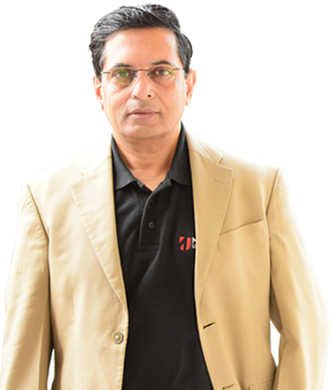
Dr. Shashidhar Nanjundaiah
School of Digital Media and Communication
It is my pleasure to explain what Mahindra University’s School of Digital Media and Communication stands for and why our students will find themselves at the cutting edge of what their world has to offer.
About Us
Mahindra University’s School of Media aims to prepare our graduates as righteous, responsible, competent and globally acceptable citizens of the world. The School of Media is the outcome of a perceived need at the intersection of the fields and practices of mediated communication, communication technology and social change.
Purpose
Hence, the purpose of the School is to equip students with the analytical tools to confront the world of communication, in the following ways:
Our School of Media was born in the academic year 2023-24 with two bachelor’s programmes. We offer a 3-year BA and a 4-year BA (Hons.) in Journalism and Mass Communication, and a 4-year BTech in Computation and Media. With the application of digital technology, the media and related industries have been experiencing unprecedented growth. The introduction of mediated communication for the public at large has meant that this growth has become a mass movement among “media prosumers”—consumers who are also producers of media texts. Since everyone equipped with a smartphone is a potential media prosumer, the practice of superior mediated communication defines its contours. This is not merely a technological change but a sociological one. To that end, our BA and BTech. programmes recognize digital technology as an inevitable and integral part of mediated communication today and in time to come.
This exciting time also presents several challenges. The ever-evolving field of mass communication now, more than ever before, needs an all-round understanding of technology and sociology, between message and its construction. This convergence of information, entertainment, opinion, promotion and distribution presents an exciting new cornucopia of activities bundled together.
There is also convergence in another way. In addition to a steady demand for professionals in the more conventional roles in news, entertainment, and the allied areas of advertising and public relations, there is an increasing demand for digital journalists, content creators and digital marketing professionals. Legacy media platforms are investing heavily on the digital side of their businesses. Other industries, too, are investing in creating or recasting media rooms in digitized forms, from which internal and external communication and corporate storytelling occurs. The ability to understand, delineate and control each of these activities distinguishes the media and communication professional from a prosumer.
To that end, our programmes integrate all that is needed in this new and evolving ecosystem to deliver academically sound, research-oriented, practically trained graduates. You will gain exposure to cutting-edge developments, both in technology and techniques of creating content and its delivery for the functions of news, entertainment, PR, advertising, corporate communication, and digital platforms.
In 2024, we have added a Ph.D. programme in Media and Communication. Master’s programmes in journalism, mass communication, and communication management will be introduced in 2025.
Enabling the practical side of learning are our three digital studios: (i) a large floor with two sets including a production control room (PCR), a greenscreen set, a conventional set, and a conveniently styled gallery-seating space; (ii) an audio studio; and (iii) an immersive media studio floor with cyclorama and other paraphernalia for such exciting productions as music videos.
Vision and mission
Learning process
At the School of Media, it is our endeavour to see learning as a joint venture between the student and the institution. How a student peels an onion ring, going deeper into the funnel of learning, must be demonstrated by linking concepts to practice. Using this process, our courses are designed around student-centric learning processes and competency outcomes of three dimensions—conceptual, practical/professional, and ethical.
Through the period of a student’s journey, we will introduce a variety of learning mechanisms and tools, including classes, laboratory work, independent and field work, library, guest interactions, and self-discovery. However, the student will quickly recognize the complexities in the practice and learn to problematize practices while developing an increasingly firm grip on fundamental concepts of the functions of journalism, media production and communication management. It is this blend that makes our graduates technologically strong and ethically sound, conceptually clear and practically adept.
Exposing students to eclectic voices is an important part of their learning. Academic, institutional, and industry partnerships include reputed institutions and organizations from around the world. The student’s journey will be peppered with guest visits and demonstrations, field visits and internships. We expect the student to have fun while being serious-minded, relish hard work while not losing out on the enjoyment of life’s normal experiences.
The curriculum has been prepared with the student’s journey in focus. How does a student navigate the path to the world of practice? That is the fundamental pedagogic question we seek to answer; we believe the answer lies in taking the student through increasingly complex units of knowledge. Hence, amidst the cornucopia of coursework lie clearly focused pipelines for each strand. Faculty members are empowered at the School of Media to bring their philosophies, perspectives, and content. Our institution welcomes and encourages the use of individual strengths and thought. Students will receive specific syllabi with textbooks (if any) and indications of reading material at the beginning of each course.
Methodology: Building communicative societies
We will employ the highest standards to develop and nurture qualities needed for a student to be a changemaker. The input is carefully constructed keeping in mind the demands of industries and businesses, as well as the needs of our societies, to generate a conceptually, ethically, practically and behaviourally consummate graduate who is aware of the rights, responsibilities and privileges of an educated and communicative citizen. Special emphasis will be laid on digital and emerging media technologies as we further update the institution on the basis of technological and sociological developments.
Programme goals. The objectives of our programmes are heavily centred around the learner.
Thus, competency-building is the fulcrum of the collaborative interface between the School of Media and the student. The various demonstrable elements of these competencies perform a critical role not only for a student in the commitment to their role and exercise of responsible agency, but also for the institution in its commitment to the student. To us, competency is not to be defined in narrow curricular or practical success terms, but as the development of a personality that is professionally, critically, and ethically superior—thinking problem-solving researchers and professionals who can rethink paradigms and not become cookie-cutter bench-warmers.
The tripod of competencies. As a derivation from the above philosophical grounding, each of our programmes emerge as a marker, a demonstration of the following competencies—in combination—that will define and test this pursuit:
Furthermore, competency is a changemaking methodology, which goes well beyond the development of skills alone. It is the ability to adapt with a combination of acquired strengths and learnt behaviour. That is why we are convinced that the building of skills must necessarily accompany the construction of other attitudes that both enable and moderate our practices. The tripodic combination of competencies as described above is also individual. To that end, we believe it is imperative to keep our objectives student-centric and nurture individuals-in-societies—that is, individuals who are grounded in the governance of various industrial and sociocultural communities.
Our approach is multi-pronged in the sense that the student must be prepared both in and out of classrooms. Some forms this would take would bridge traditionally disparate paradigms:
Two approaches that can sustain the University head and shoulders above the normal fare we observe around us. There are several methodological ‘firsts’ that the University would have. A broader philosophy of approaching academics as a student-centric endeavour rather than just a set of tasks for us to accomplish will go a long way in establishing the University as a pioneer in disruptive methods in higher education. This by corollary entails a student-centric vision, mission, plan, and pedagogy. How do we help a student achieve his/her professional objectives?
The approaches I have explained below are needed for the much-talked-about (yet elusive!) excellence in higher education per se. In communication, I believe they are both critical, but I suspect their relevance can easily be mapped onto other fields. As you may observe from these approaches, the pedagogy, or the “how”, has precedence over the content, or the “what” of higher education.
First, we ask ourselves what the end objective of a student’s tenure with us is. We may assume it is gainful employment, either in the industry or self-employment, through a combination of conceptual and field exposure, theory-application and practical output.
Second, we identify what approaches we must adopt to fulfil that objective. In short, our endeavour must be to adopt methodological approaches that facilitate a student to transform into a responsible professional with a researcher’s mind.
Industry, global outreach
Internships, projects, and placements
- Newspaper newsrooms and production units
- Digital newsrooms and production units
- Television newsrooms and production units
- Television show production houses
- Digital production and digital marketing agencies
- Digital film production housesMedia and film marketing agencies
- Advertising agencies
- Public relations consultancies
- Corporate communication divisions
- Event management
- Digital agencies
- Game design studios
- Editing and FX studios
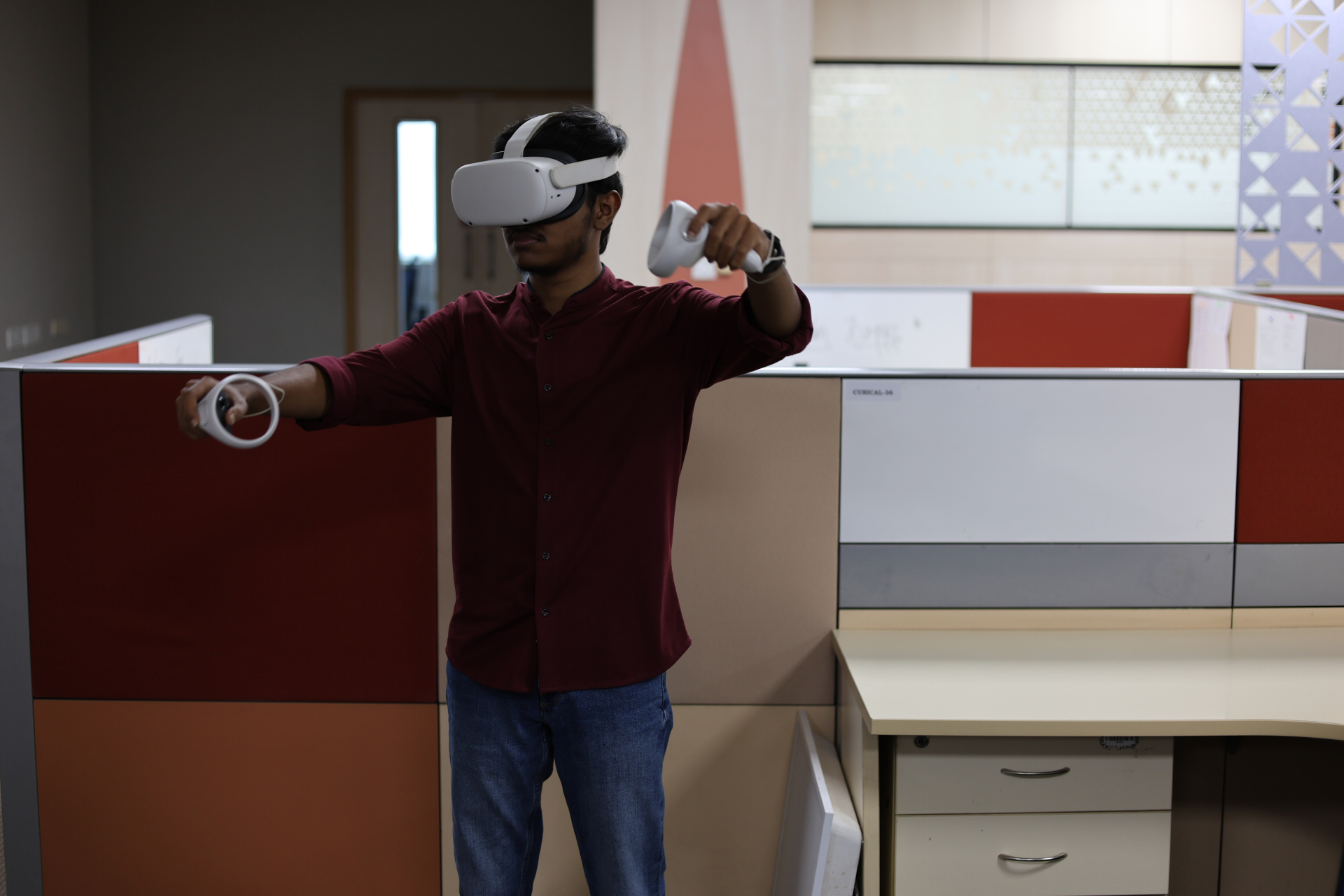
Entrepreneurship
In lieu of the final internship, a media entrepreneurship project may be incubated and implemented. An entrepreneurship course in media- or communication-related domains is offered in lieu of any one of the internships. Under this, innovative projects will be incubated and presented to industry experts and to potential investors. Students may opt for domains that may be different from their core specialization.
Global connect
Mahindra University has numerous global partnerships around the world, both with top industries and with reputed universities. Some of them entail short-term curated courses to be taken on the global campuses, while others may be longer-term collaborative courses. Some examples are our partnerships with the University of Florida and Virginia Tech in the USA, La Trobe University in Australia, Frankfurt School of Finance & Management in Germany, and École Centrale of France.
School of Media students may take advantage of our collaborative initiatives. For example, our students can join the cohort that travels to Cornell University, a top Ivy League university in the US to take a four-week programme in media entrepreneurship. The package also includes an educational tour to New York City, and cultural programmes.
School of Media also has struck a working partnership with Southern Illinois University, Carbondale. Students will be guided to take specific courses in the College of Arts and Media there.
Our course plan is designed to enable this and many other global exposure opportunities for our students. For example, the final semester may be taken off-campus since much of it comprises projects, and students may also take one or two online courses in that semester. Often, internally and externally funded fellowships and scholarships are available to pursue courses or full programmes in international campuses.
 Dr. Shashidhar Nanjundaiah
Dr. Shashidhar Nanjundaiah